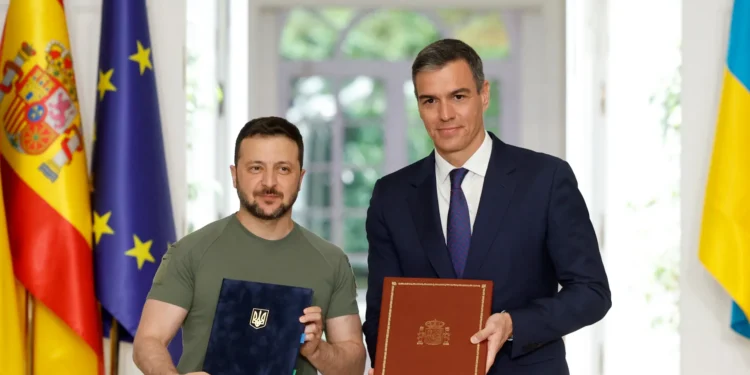Spain has committed to supplying Ukraine with €1 billion in military aid as part of a decade-long defense and security agreement. The announcement followed a meeting between Spanish Prime Minister Pedro Sánchez and Ukrainian President Volodymyr Zelenskiy in Madrid. This significant bilateral deal aims to enhance Ukraine’s defense capabilities, particularly its air defense systems, which are crucial in protecting civilians and infrastructure amidst ongoing Russian attacks. The agreement was signed shortly after a devastating Russian assault on Kharkiv, which killed 18 people, underscoring the urgent need for bolstered Ukrainian defenses. Prime Minister Sánchez emphasized that the aid will prioritize Ukraine’s air defense capacities to shield against indiscriminate attacks. Spain has already pledged to supply Patriot missiles and additional Leopard tanks and ammunition. Beyond military hardware, the deal includes provisions for intelligence sharing, training, de-mining, reconstruction, and humanitarian assistance.
President Zelenskiy expressed gratitude for Spain’s substantial support, highlighting the life-saving impact of the aid. However, he stressed the urgent need for more Patriot air defense systems to counteract Russian glide bomb attacks, which have been used to target Ukraine’s power grid and civilian areas. These heavy bombs, fitted with precision guidance systems, are launched from aircraft out of range of air defenses and cause significant destruction upon impact. Amidst this backdrop, the European Union is facing internal challenges in its support for Ukraine. Hungary has been blocking the disbursement of approximately €6.5 billion in EU military aid, including a new €5 billion fund agreed upon in March. Hungarian Prime Minister Viktor Orbán’s actions have been a significant point of contention, with other EU member states growing increasingly frustrated. Hungary’s stance has impeded nearly half of all EU declarations on Ukraine since the Russian invasion began in 2022.
Lithuania’s Foreign Minister, Gabrielius Landsbergis, highlighted Hungary’s obstructionist role, noting that it has blocked about 41% of EU resolutions on Ukraine. He called for transparency regarding Hungary’s position, which he argues hampers the EU’s ability to respond effectively to the crisis. Landsbergis also acknowledged the difficulty in removing Hungary’s voting power on EU-wide foreign policy decisions, as it requires unanimity among member states. Ireland’s Deputy Prime Minister, Micheál Martin, reported robust discussions among EU ministers about unlocking the European Peace Facility to expedite aid to Ukraine. EU’s chief diplomat, Josep Borrell, stressed that Hungary’s actions are costing lives, emphasizing that the delay in aid translates directly into human suffering on the ground in Ukraine.
This renewed focus on military aid to Ukraine highlights the broader geopolitical struggles within the EU and the urgent need for unified action in the face of escalating conflict. The Spanish-Ukrainian defense agreement marks a significant step in strengthening Ukraine’s defense infrastructure, aiming to provide both immediate relief and long-term security improvements.
















